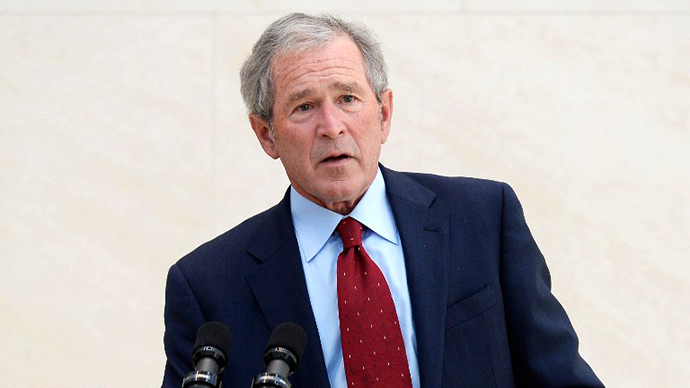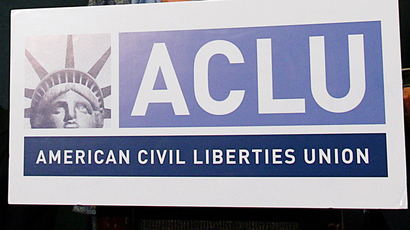Bush: Snowden ‘damaged the security of the country’

The security of the United States has been compromised due to the recent disclosure of documents pertaining to secretive government-run surveillance programs, former president George W. Bush told CNN in an interview set to air Monday.
Bush, the two-term president who authorized the National Security Agency spy programs as a counterterrorism tool shortly after the September 11, 2001 attacks, told CNN that the recent leaks attributed to 30-year-old former intelligence contractor Edward Snowden have hurt the US.
“I think he damaged the security of the country,” Bush said of Snowden’s leaks.
The remark, made in an interview with CNN’s Erin Burnett while the former president was visiting Africa, is not scheduled to air until Monday afternoon. In a snippet already available on the Web, however, viewers can see Mr. Bush open up about the NSA scandal for the first time since The Guardian newspaper began publishing documents provided by Snowden.
Since The Guardian’s initial report on June 6, that paper and others have sporadically published additional proof of the NSA’s widespread practices started under President Bush and continued under President Barack Obama that have placed the everyday Internet and phone habits of millions of Americans and others under the microscope of the federal government.
President Obama and members of both his administration and the Bush White House have repeatedly defended the surveillance programs in the wake of the first exposé published by the newspaper, notwithstanding accusations brought by the likes of Congress and concerned citizens alike that the government has committed vast constitutional violations by infringing on Fourth Amendment-guaranteed protections from unlawful search and seizure.
Speaking to CNN, Bush not only condemned Snowden’s actions but defended the surveillance policies he signed off on more than a decade earlier.
“I put that program in place to protect the country,” Bush said. “One of the certainties was that civil liberties were guaranteed.”
Although the leaked documents provided by Snowden in recent weeks have only started to expose the scope of the surveillance program, they weren’t the first disclosure made about the initiatives. The New York Times first blew the whistle on Bush’s warrantless wiretapping program in late 2005, prompting the then-president to make a statement during a weekly radio address just days later.
“The authorization I gave the National Security Agency after September the Eleventh helped address that problem in a way that is fully consistent with my constitutional responsibilities and authorities,” Bush said at the time.
“This authorization is a vital tool in our war against the terrorists,” he added, calling it “critical to saving American lives.”
“The American people expect me to do everything in my power under our laws and Constitution to protect them and their civil liberties. And that is exactly what I will continue to do, so long as I'm the President of the United States,” Bush said.
Now as more is learned due to Snowden’s disclosures, the practices of both the Bush and Obama administrations are under attack. The American Civil Liberties Union filed a lawsuit against the Obama administration last month accusing the White House of denying them a “reasonable expectation of privacy, free speech and association, right to be free of unreasonable searches and seizures and due process rights,” and the current commander-in-chief has previously resorted to making remarks similar to the latest quips courtesy of Mr. Bush in order to defend the NSA’s habits.
“In the abstract you can complain about Big Brother and how this is a potential program run amok, but when you actually look at the details then I think we’ve struck the right balance,” Pres. Obama said last month.
Speaking to CNN, Mr. Bush said, “I think there needs to be a balance, and as the president explained, there is a proper balance.”
Bush isn’t the first from a major figure from Washington to remark about an alleged security breach in the wake of Snowden’s disclosures, either. NSA Director Keith Alexander said previously that “Our security is jeopardized” due to the leak. Michael Hayden, who served as director of the NSA under both President Bush and Obama, told RT previously that Snowden’s “commitment to absolute transparency has created great harm to the security of people around the world.”
Adding to CNN, Bush said he thinks Obama “will deal” with the fallout of the leaks properly. Snowden has been indicted with counts of espionage and could spend decades in prison if extradited to the US and convicted during trial. He is currently reported to be in Moscow, Russia.
In only the three weeks since The Guardian first revealed that
telephony metadata was being collected on a widespread scale, new
leaks — including those published as recently as this weekend —
have exposed how the NSA taps into the servers of major Internet
companies and conducts surveillance targeting foreign consulates
and missions. Glenn Greenwald, the American journalist who first
reported on the leaked documents, said that Snowden had archived
“thousands” of files of which he believed “dozens”
were newsworthy. Greenwald added that precautions have been taken
to ensure that documents would continue to be leaked should
either of the men’s safety become compromised, and on Monday he
wrote on Twitter that “Snowden's leak is basically done.”
“It's newspapers - not Snowden - deciding what gets disclosed
and in what sequence,” wrote Greenwald.













